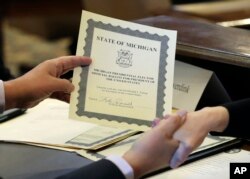President Donald Trump isn't getting the facts straight when it comes to how he won the 2016 election.
He's denouncing special counsel Robert Mueller's investigation into Russian interference in the 2016 election as a hoax, saying Democrats are unhappy after blowing a win in an Electoral College system in which they have a "tremendous advantage."
It's not true as to the Electoral College — some Democrats, in fact, would prefer to get rid of it.
Trump wouldn't have won the presidency without the Electoral College system, in which the votes of smaller rural states that tend to vote Republican are weighted more heavily than big, Democratic-leaning states like New York and California.
He also glosses over the fact that his own Justice Department appointed Mueller to conduct the special investigation into Russia's role in the election, including contacts with the Trump campaign.
A look at Trump's claim
TRUMP on Democrats: "This was a — really a hoax created largely by the Democrats as a way of softening the blow of a loss, which is a loss that, frankly, they shouldn't have had from the standpoint that it's very easy for them. They have a tremendous advantage in the Electoral College. And this is what it is, and this is where it came from." — remarks made Wednesday.
THE FACTS: He's misguided to assert that Democrats have a "tremendous advantage" in the Electoral College, as he often does. In fact, its unique system of electing presidents is a big reason why Trump won the presidency. Four candidates in history have won a majority of the popular vote only to be denied the presidency by the Electoral College. All were Democrats.
Democrat Hillary Clinton received nearly 2.9 million more votes than Trump in the 2016 election, after racking up more lopsided wins in big states like New York and California, according to election data compiled by The Associated Press. But she lost the presidency because of Trump's winning margin in the Electoral College, which came after he pulled out narrow victories in lesser populated Midwestern states like Michigan and Wisconsin. (Trump did win Texas, a big state that has traditionally voted Republican.)
Unlike the popular vote, Electoral College votes are set equal to the number of U.S. representatives in each state plus its two senators. That means more weight is given to a single vote in a small state than the vote of someone in a large state.
In recent elections, smaller rural states and working-class whites in the slower-growing Midwest have often tilted Republican. That's in contrast to bigger states like California and New York with faster-growing nonwhite populations, who tend to vote Democrat.
Popular vote
In the aftermath of Clinton's loss in 2016, some Democrats urged a switch to the popular vote as the method of picking the president. That's because they feel disadvantaged by the Electoral College. A switch would require a constitutional amendment, and an effort to gain passage of it would be unlikely to succeed.
Clinton is the fifth U.S. presidential candidate to come out ahead in the popular vote but fail to win the Electoral College, and therefore lose the presidency. Democrat Al Gore in 2000 suffered the same fate.
The other three who fell short were Democrats Samuel Tilden and Grover Cleveland. Andrew Jackson of the Democratic-Republican Party won a plurality of the popular and Electoral College votes in 1824, short of a majority. He was passed over in favor of John Quincy Adams in the House of Representatives' ultimate selection of the president. Jackson later joined a new Democratic party after his supporters blamed his loss on a rigged election system.





